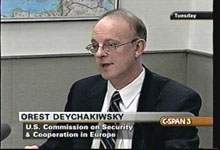
AUDIO: Orest Deychakiwsky, Staff Advisor, Commission on Security and Cooperation in Europe
Audio/text: RFE/RL forum on Ukraine elections, November 30, 2004
AUDIO clips:

|
AUDIO: Orest Deychakiwsky, Staff Advisor, Commission on Security and Cooperation in Europe |
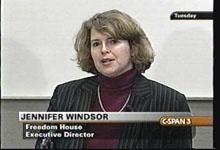
|
Remarks at RFE/RL forum on Ukraine elections
November 30, 2004, 9:15-10:30 am
Orest Deychakiwsky, Staff Advisor, Commission on Security and Cooperation in Europe
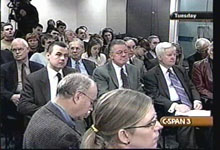
|
When Martins Zvaners contacted me to invite me to this forum a few weeks ago, little did I, or I suspect most of us, think that the subsequent events would turn out to be as dramatic, momentous and, indeed, historic as has been the case, and how they would garner the world's attention. It's difficult to know what to focus on given all of the rapid developments, and given the time constraints, so what I'd like to do is: First, offer some of my experiences in Kyiv and Kirovohrad as an international observer for the OSCE as an illustrative example of some of what went on; and second, offer some thoughts on what is being called the Orange, or Chestnut, revolution.
What we are witnessing is what Ukrainian writer Oksana Zabuzhko last week called the awakening of a nation. It's a story of courage and determination spanning generations.
I returned from Kyiv last Tuesday night. It was an experience that nobody involved will ever forget. You've seen the reports of the OSCE (of which Ukraine is a member), of Sen. Lugar as President Bush's personal envoy, of ENEMO, NDI and IRI. You've seen the numerous expressions of concern by senior U.S. officials and many other governments, international institutions, NGOs both within and outside Ukraine, including the Ukrainian-American community, and the international media. The International Election Observation Mission, which included the OSCE along with parliamentary assemblies of OSCE, Council of Europe, NATO and the EU), was the first to issue its preliminary findings on the day after the elections. Based on detailed reports filed by nearly 600 observers who visited over 2,300 polling stations, they concluded that the elections "did not meet a considerable number of OSCE commitments and CoE and other European standards for democratic elections" and asserted that "Overall, state executive authorities and the CEC displayed a lack of will to conduct a genuine democratic election process."
Only the CIS observers, who never met an election in the CIS they didn't like, gave these elections the thumbs up. Their conclusions might be aptly labelled as "eyes wide shut."
In the last week, most of the international community has spoken out. And Poland, Ukraine's best friend today, has been very supportive, with Kwasniewski and Walesa visiting and trying to help resolve the impasse. The U.S. and EU have been in lockstep on this - all urging a review of the election results. The US executive branch became increasingly more assertive, with strong statements by the White House last Wednesday and especially Sec. Powell last Thursday in which he said that the U.S. does not consider legitimate the results of elections in Ukraine, challenged its leaders to "decide whether they are on the side of democracy or not," and talked of consequences, including hinting at further visa denials. And the White House and Sec. Powell as well as the EU yesterday stressed the importance of Ukraine's territorial integrity in light of some of the recent moves towards authonomy in the south-east and a peaceful solution to the impasse. (Parenthetically, Congress has been calling attention to these elections for a long time, with statements by Helsinki Commission co-chairs Rep. Chris Smith and Sen. Campbell dating back to nearly a year ago, briefings, resolutions that passed the House and Senate (see www.csce.gov), Sen McCain and Lugar visits, the bill on sanctions, delegations of former Members, and, within the last week, strong statements by Helsinki Commissioners and various Senators and Representatives).
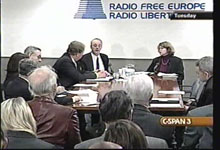
|
The bottom line is that the elections were stolen. The independent and respected Committee for Voters of Ukraine (CVU) asserted that at least 2.8 million ballots were rigged in favour of Yanukovich. Violations are too numerous to enumerate.
They were extensive and they were flagrant, and what happened in Donetsk in terms of "getting out the vote" and the positive vote for the "right" candidate was reminiscent of the electoral zealotry of Soviet times. My colleague from the Commission Ron McNamara and I were in Kirovohrad, in the center of Ukraine -- on the dividing line between the northern and western oblasts that voted for Yushchenko and the eastern and southern regions that went for Yanukovich. On election day and night, we were in the infamous Territorial Electoral Commission (TEC 100), where problems were legion during the first round on October 31. Unfortunately, we weren't disappointed. While at some polling stations, the voting process was orderly and normal, at others it was highly problematic. Pro-Yushchenko polling station commissioners had been thrown off the commissions, but many were pushing back. The local court was crowded with those dismissed seeking reinstatement. We hurried to the court where we spoke with people, some crying, who recounted their frustration and disbelief at this injustice. (We heard from some of them, as from so many others in Ukraine -- "we just want to live in an honest, decent country"). We met with some of the judges who were reinstating these people as polling commission members, clearly displaying courage in doing so given the possible consequences.
These mass expulsions contributed to an air of confusion throughout the afternoon and into the night. Some polling station chairmen were not allowing polling station commissioners back on even after they had been reinstated. In one case, we accompanied a woman whose case my colleague Ron McNamara had heard back to her polling station, where the reception towards her was cold, and I strongly suspect the only reason they let her back in was because there were international observers present. Another polling station we observed had only opened up at 4:10 pm(!), as eight out of the eighteen members of the polling station commission simply failed to show up to open the station in the morning, thus potentially disenfranchising hundreds of student voters at the technical university. The other polling station workers finally had to break into the safe in order to obtain the ballot papers and other materials so that the voters -- mostly students -- could exercise their right to vote. (You also saw "hanger-ons" and heads of PECs not even knowing who they were representing).
At the count we attended, a pro-Yushchenko observer was forced to leave right before the count commenced. I spoke with this woman and it became clear that the reasons for her being thrown out were specious at best. Others had been thrown out earlier in the week. Despite this, the counting process seemed to go relatively smoothly, and Yushchenko emerged victorious with 1,221 votes to Yanukovich's 725. Or so we thought... After our return to Kyiv the next day, we learned that the Territorial Election Commission had reported that in that particular precinct, Yanukovich "won" by 1670 to Yushchenko's 276. A reversal of the count, with a vengeance! At the polling station where my colleague Ron observed the count neaby in Kirovohrad and where Yushchenko won by nearly a three to one margin, there were 312 unmarked ballots missing, which meant that the results were not accepted. And this is just the tip of the iceberg in Kirovohrad alone.
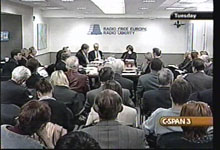
|
Group voting with the notorious absentee ballots, organized by state-owned and some private companies, was one of the major violations that significantly altered the results (nearly 5%, according to OSCE), or, something which has gotten less attention, the high numbers of people who participated in mobile voting (i.e. voting at their homes or hospitals), which is ripe for fraud, in certain oblasts compared to the first round. And, of course, pressure on state employees to produce the right results or vote the right way.
In the East, voter turnout in the second round increased by 9 percent. For example, in Donetsk oblast there was 96,65 per cent turn out compared to 78 in the first round (and 96 percent voting for Yanukovich). But in Western Ukraine, the turn out grew only by 1,5 percent. In some precincts in Donetsk, turnout reportedly exceeded 100 percent. This would point to ballot box stuffing, which used to be a widespread technique in communist times in order to reach very high voter turn out.
We've all seen the pictures of masses of people on the Maidan and on Khreshchatyk, gathered in support of Victor Yushchenko, braving the freezing cold and snow. My colleague Ron and I were on the Maidan on Monday night and Tuesday morning. The mood was one of determination, yet there was an element of festivity, optimism and ebullience, which by all accounts has remained as hundreds of thousands more have poured in from all over Ukraine. Witnessing this massive expression of support for democracy was deeply inspiring. There appeared to be virtually no overt police presence in the center of Kyiv. The rally was peaceful, orderly, and remarkably well organized. The organizers were appealing to the crowds to only listen to instructions from them on what and how to proceed, and not to give in to any provocations. Clearly, the opposition is trying to do everything that it can to ensure that this expression of the will of the people remains peaceful and dignified. Kyiv Mayor Omelchenko and the Kyiv city council are supporting the protestors to help ensure their comfort, health and safety. There is a real network to sustain the protests.
The countless numbers of protestors in Kyiv and across Ukraine are the front lines in the struggle for democracy, human dignity, respect for the will of the people and against a return to the past. They are on the front lines in the struggle against any return to Ukraine's colonial past. They are struggling for freedom and, in a very real sense, true independence.
Ukraine's democracy, for all of its obvious flaws as illustrated by these elections, and its civil society is further developed than any other in the CIS. It is no accident that the Putins and Lukashenkas of the world are watching this election carefully (And, by the way, the chutzpah of the Russians when they accuse the U.S. and Europe of interfering in these elections and subsequent developments is something to behold. Just imagine the outcry if President Bush would have visited Ukraine several times and actively supported one of the candidates, pumping hundreds of millions, or if Bush would have twice congratulated a candidate even before he was pronounced the official winner in Ukraine).
I should add that the democratic movements in Belarus, Russia, and the CIS are also watching developments intently, as which way Ukraine goes will shape Russian and CIS moves towards democracy. (For example, Belarusian democrats have been demonstrating in support of the orange revolution and some who had been in Kyiv were detained and roughed up at the Ukrainian-Belarusian border).
I think the following quote by Zbigniew Brzezinski sums it up perfectly and more articulately than I can: "The Ukrainian struggle for democracy is the struggle for the future of Russia. If Ukrainian democracy prevails, Russia has no choice but to go that way and be a democracy. If Ukrainian democracy fails, Russian imperial ambitions are reawakened and there is a temptation of an alternative future which is imperial and authoritarian."
Clearly, what is happening in Ukraine has very important geo-political implications. Russia would like to separate Ukraine from the West and make it co-dependent, possibly with a view towards an eventual restoration of empire. It's also about oil and gas pipeline politics, with its intersection of geo-politics and money. However, there are also many Russians who are very uncomfortable with their government's heavy-handed involvement in the Ukrainian elections, including some in their independent press.
But I think that for the average Ukrainian, including those on the front lines protesting, it's not principally, if at all, about geo-politics; not about Russia vs. West. It's about corruption versus reform, democracy versus authoritarianism, truth and trust versus lies, a brighter future versus prolonging the status quo. It's not about the sometimes oversimplified East-West divisions in Ukraine. There have been few public protests on behalf of Yanukovich and some of his supporters seem to get co-opted when they came to Kyiv to demonstrate for their man. (Reports of Yushchenko and Yanukovich supporters in Kyiv intermingling, and even embracing and kissing each other). Rallies in support of Yushchenko have not been limited to western and central Ukraine - they are also being held in cities in eastern Ukraine. Importantly, the moves by some eastern oblasts within the last few days towards autonomy have been rejected even within the Yanukovich camp, the starkest example perhaps being Serhiy Tyhypko's resignation yesterday as Yanukovich's campaign manager and National Bank chairman, and his saying that this talk of separatism is madness and must be stopped immediately. On the other hand, yesterday we saw violence in Luhansk against pro-Yushcehnko supporters, including an OSCE project coordinator.
And even though Yanukovich won resoundingly in some of the eastern oblasts (and would have even despite the falsifications), one wonders what the results would have been if you would have had the UT 1, 1+1 and Inter tv and other channels reporting objectively during the electoral campaign. Thankfully, there appears to be a dramatic shift in media reporting within the last week, although there are reports that some of these stations are being blocked out in some of the eastern oblasts.
Or if you wouldn't have had the use of "administrative resources" and pressure and intimidation on behalf of Yanukovich.
Or if you didn't have a campaign of so-called black PR -- vicious lies designed to portray Yushchenko as a radical nationalist American stooge;
Or if his poisoning wouldn't have prevented him from losing valuable time campaigning.
Indeed, the authorities' campaign to divide, and not unite, represents one of the lowest of the many low points in the campaign.
Countless people, from the members of the Ukrainian national and local governments, to the military and members of the security forces; to the Ukrainian diplomats in the Embassy here in Washington demanding that the elections reflect the will of the people; to the journalists - both independent and now increasingly those working for the state channels who broke state-imposed censorship; to the protestors old and young alike braving the cold; to the ordinary, and yet very extraordinary women in Kirovohrad fighting for their rights, all are displaying remarkable courage and determination. They are taking risks, because there are no guarantees of how things will come out.
The historic, dramatic events in Ukraine continue. Legal, peaceful methods are being pursued. Following the CEC declaration of Yanukovich as the winner last Wednesday, the Supreme Court effectively banned him from being inaugurated until it heard the Yushchenko campaign's allegations of ballot fraud. Today, the Supreme Court of Ukraine passed a decision, which forbids the Central Election Commission to publish the official results of the presidential elections. The newly elected president can only take office no later than 30 days after the publication of these results. On Saturday, the Rada (parliament) effectively rejected the results of the election and expressed mistrust in the Central Election Commission "in connection with improper performance of its duties".
Talks, with the participation of both candidates, President Kuchma and European intermediaries were held on Friday and working groups continue to meet. Nobody can predict with certainty how things will turn out, although all indications as of this time point towards repeat voting or a new election.
But there is one thing that I believe is beyond dispute: the people of Ukraine are determined to achieve their rights in a peaceful manner and to live in a democratic, free and independent country. It's an idea whose time has come!
Ukraine's motto: Volia, Zlahoda, I Dobro
"Freedom, Accord, and Goodness"